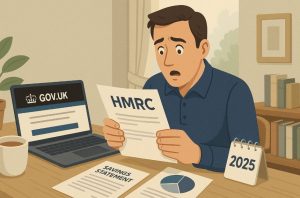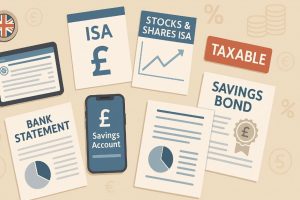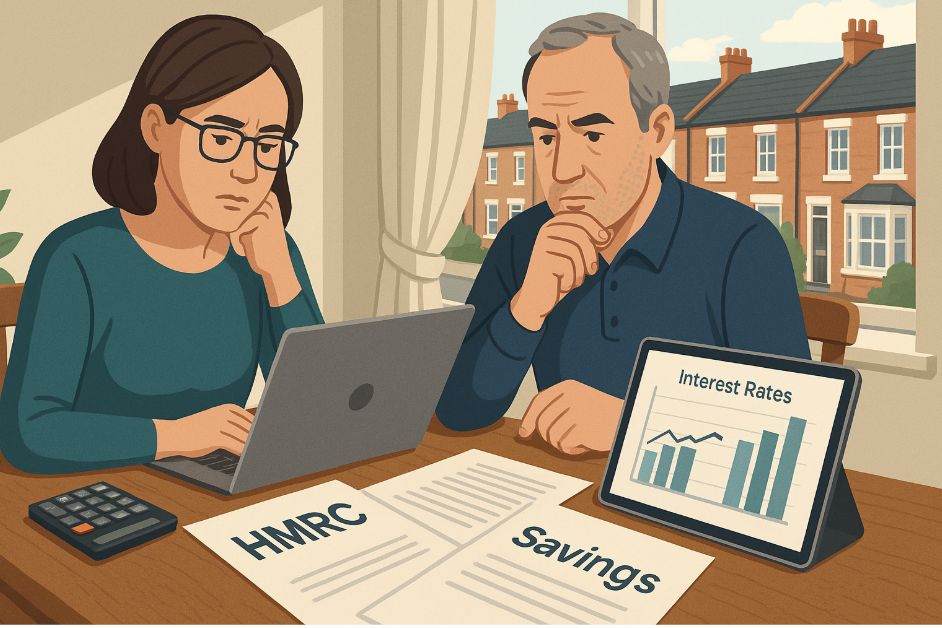The financial landscape in the UK has shifted significantly in recent years. With interest rates rising and tax allowances remaining static, many ordinary savers now find themselves liable to pay tax on interest they previously thought was tax-free. In 2025, HMRC’s tax savings warning serves as a crucial alert for UK taxpayers especially those earning interest above certain thresholds.
This guide explores what this warning means, how the Personal Savings Allowance operates, and how taxpayers can stay compliant while maximising their savings legally.
What is HMRC’s Latest Warning About Savings in 2025?

In early 2025, HMRC issued a public warning that a growing number of UK savers may be liable for tax due to exceeding the Personal Savings Allowance (PSA). The concern is particularly relevant for individuals earning interest over £3,500 annually, a figure increasingly achievable even with modest savings in today’s high-interest environment.
The Growing Impact of High Interest Rates
Over the past two years, interest rates from banks and building societies have steadily increased. Basic savings accounts now frequently offer 4%–5% annual interest, which can result in significantly higher returns than what savers earned just a few years ago.
Why This Warning Matters Now?
In previous years, savers rarely needed to think about tax on their interest. But with the PSA remaining unchanged and interest earnings rising, more people are now crossing the threshold, often unknowingly. This has prompted HMRC to issue guidance to avoid non-compliance, unexpected bills, or potential fines.
How Does the Personal Savings Allowance Work in the UK?
The Personal Savings Allowance is a tax-free threshold on the interest you can earn from savings. Its value depends entirely on your income tax band, which is determined by your overall income, including employment, pensions, rental income, and dividends.
Personal Savings Allowance by Tax Band
| Income Tax Band | Savings Allowance | Tax Rate on Excess Interest |
| Basic Rate (20%) | £1,000 | 20% |
| Higher Rate (40%) | £500 | 40% |
| Additional Rate (45%) | £0 | 45% |
Example Scenario
A basic-rate taxpayer with £25,000 in savings at 4.5% interest will earn approximately £1,125 annually. That’s £125 over the £1,000 PSA, meaning they’ll owe £25 in tax (20% of £125).
This illustrates how easily savers can surpass their allowance, particularly if they’re not monitoring their interest earnings regularly.
Why Are More UK Taxpayers Paying Tax on Their Savings?
The rise in taxable interest isn’t just a result of higher returns. it’s also due to what economists call fiscal drag. This occurs when tax thresholds are frozen or not adjusted for inflation, causing more people to fall into higher tax bands.
The Role of Frozen Tax Thresholds
Since 2021, the UK government has chosen to freeze the personal income tax bands. As incomes rise due to inflation or career progression, more individuals are pushed into higher bands without actual increases in real purchasing power.
Effect of Rising Interest Rates on Savings Tax
In the current economic climate, even low-risk savings products like easy-access accounts can produce enough interest to exceed the PSA. For example:
- £20,000 in a 5% account = £1,000 interest
- £35,000 in a 5% account = £1,750 interest
These figures show how savers with moderate savings are now affected.
What Types of Savings are Taxable Under HMRC Rules?

Understanding which financial products are taxable is essential to avoid unexpected bills. HMRC taxes most forms of interest earned from standard savings instruments.
Taxable Savings and Investment Products
- Standard savings accounts from banks and building societies
- Fixed rate savings bonds and term deposits
- Credit union savings and interest accounts
- Business savings accounts, if interest is earned personally
Savings Products Exempt from Tax
Certain savings vehicles remain fully or partially exempt from income tax:
- ISAs (Individual Savings Accounts): Interest is always tax-free
- Premium Bonds: Winnings are not taxable
- Certain NS&I products: Such as the Index-linked Savings Certificates
Utilising these accounts effectively can shield a significant portion of your savings from HMRC scrutiny.
How Can Taxpayers Check If They Owe Tax on Their Savings?
With so many people being unknowingly pulled into tax obligations, knowing how to track your interest income is key to staying compliant.
Tracking Savings Interest Accurately
HMRC encourages savers to do the following:
- Review annual interest summaries from all bank and savings providers
- Log in to your Personal Tax Account on the GOV.UK website to view declared income
- Use tax calculators provided by HMRC or financial websites to estimate obligations
PAYE vs. Self Assessment Reporting
- If you are employed or retired and under the PSA, your bank may report your interest to HMRC, and the tax could be adjusted through PAYE.
- If your savings interest exceeds £10,000 (alongside dividends), you must file a Self Assessment tax return.
What Are the Consequences of Ignoring Savings Tax Obligations?
Failing to declare taxable interest can lead to serious financial and legal repercussions.
Penalties for Non-Compliance
- Automatic penalties for late payment
- Interest charges on overdue amounts
- Fines for negligence or intentional evasion
- Potential HMRC investigations or audits
Examples of HMRC Enforcement
In recent years, thousands of taxpayers have received letters demanding payment for unreported savings income. For instance, HMRC collected over £100 million in unpaid interest tax in 2024 alone, reflecting the scale of the issue.
How Can You Legally Reduce Your Taxable Savings Interest?

While paying taxes on savings is unavoidable in many cases, smart financial planning can minimise exposure.
Using Tax-Efficient Savings Vehicles
ISAs
The UK government allows adults to deposit up to £20,000 annually into ISAs. These include:
- Cash ISAs
- Stocks and Shares ISAs
- Lifetime ISAs
All interest and capital gains in these accounts are entirely tax-free.
Premium Bonds and NS&I
Premium Bonds offer tax-free prize draws instead of interest, and selected NS&I products are also exempt from tax.
Joint Accounts and Spousal Planning
If you’re married or in a civil partnership, shifting savings into a lower-earning spouse’s name can double your combined PSA. This strategy is entirely legal and commonly recommended by tax advisors.
What Changes to Savings Tax Rules Might Happen in the Future?
Although no changes have been confirmed for 2025/2026, many experts predict the government may consider revising savings tax policy due to:
Possible Reforms on the Horizon
- Increased PSA to reflect inflation
- Indexing thresholds to interest rates
- New ISA products designed for short-term savers
- More real-time data sharing between banks and HMRC for pre-populated tax returns
Political Factors Influencing Policy
Upcoming elections and party manifestos may introduce new tax reliefs or stricter compliance checks, making it essential for taxpayers to remain informed.
Should You Speak to a Tax Advisor About Your Savings?
For those unsure of their tax position or holding multiple savings accounts, consulting a qualified tax professional can be beneficial.
When Professional Advice is Useful?
- Your annual savings interest exceeds £1,000
- You hold both UK and offshore accounts
- You’re self-employed or receive foreign income
Choosing the Right Advisor
Ensure your tax advisor is HMRC-registered and ideally affiliated with a body like the Chartered Institute of Taxation or Association of Taxation Technicians.
Why Is the HMRC Tax Savings Warning So Important for UK Savers in 2025?

With rising interest rates in the UK, many savers are now earning more from their accounts than in previous years. While this may seem like good news, it also means that more individuals are exceeding the Personal Savings Allowance (PSA), resulting in tax obligations. In response, HMRC has stepped up its efforts to monitor and notify savers at risk of underpaying tax on interest income.
Increased Tax Exposure from Higher Interest Rates
As banks offer savings rates of 4% to 5% or more, even average savings balances can now generate interest above the PSA threshold. For basic-rate taxpayers, £20,000 in savings could produce £1,000 in annual interest already hitting the limit.
Automated Interest Reporting by Financial Institutions
UK financial institutions now report interest earnings directly to HMRC. This allows the tax authority to track who has exceeded their allowance and to adjust tax codes or issue warnings accordingly. Many people may not even realise they owe tax until they receive a letter or change in their PAYE tax code.
Common Saver Profiles at Higher Risk
Certain groups are especially vulnerable to breaching the allowance:
- Pensioners with substantial savings
- Middle-income employees with multiple accounts
- Self-employed individuals managing both business and personal funds
These savers are often unaware that their interest earnings could push them over the PSA.
Steps UK Taxpayers Can Take to Stay Compliant
To avoid penalties or surprise tax bills, it’s essential for UK savers to:
- Monitor total interest earned across all accounts
- Understand their PSA based on their income tax band
- Consider using tax-free options like ISAs or NS&I products
- Seek professional advice if their financial situation is more complex
By taking these precautions, savers can make the most of rising interest rates without falling foul of HMRC.
Conclusion
The HMRC tax savings warning for 2025 highlights a growing issue facing UK savers rising interest earnings pushing more individuals beyond the Personal Savings Allowance. With unchanged tax thresholds and increasing returns on even modest savings, it’s no longer just high-net-worth individuals who need to be cautious.
Taxpayers must take proactive steps:
- Monitor all interest earned across accounts
- Understand how the Personal Savings Allowance applies to their situation
- Utilise tax-efficient savings products like ISAs
- Seek professional guidance where savings and income streams become complex
By staying informed and managing savings strategically, individuals can avoid unexpected tax bills, remain compliant with HMRC regulations, and make the most of their money in 2025 and beyond.
Now more than ever, awareness is the key to safeguarding your savings from unnecessary tax exposure.
FAQs About HMRC Tax Savings Warning
What is the Personal Savings Allowance in 2025?
It remains at £1,000 for basic-rate, £500 for higher-rate, and £0 for additional-rate taxpayers.
How do I know if I’ve exceeded the PSA?
Add up interest from all your accounts. If the total exceeds your allowance, you may owe tax.
Do I need to report ISA interest to HMRC?
No. Interest from ISAs is tax-free and not reportable.
Is it better to save in ISAs or high-interest accounts?
ISAs offer tax-free returns but sometimes lower rates. A mix is often most effective.
What happens if I don’t report interest income?
HMRC can issue backdated tax bills, penalties, and interest.
Will banks report my interest to HMRC automatically?
Yes, most UK banks report your annual interest directly to HMRC.
Are pensioners affected more by the savings tax rules?
Often yes, especially those on fixed incomes with larger savings balances.









Leave feedback about this